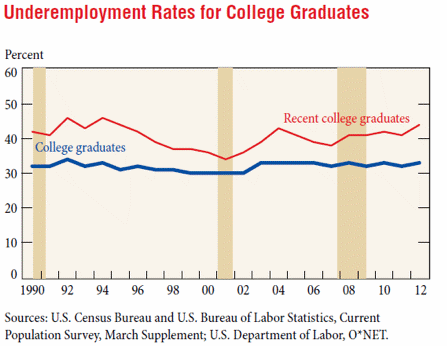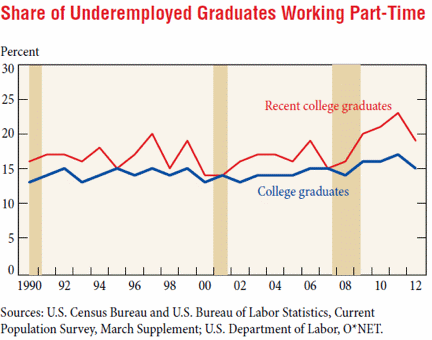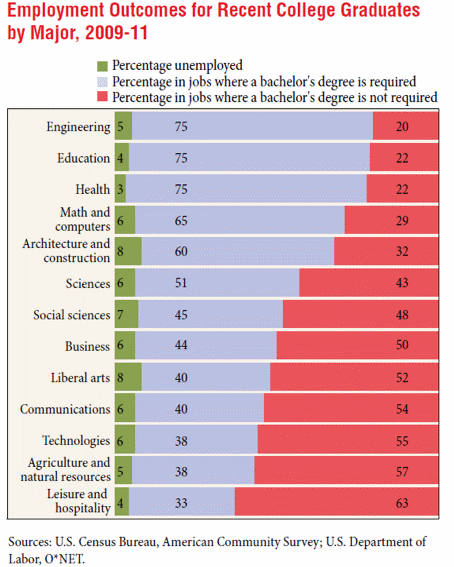College Graduates - Prepare to Be Underemployed |
By Professor Doom |
| Summer has begun
in earnest, and quite a few college students are sitting at home,
wondering why they don’t have a real job, and trying to figure out
how to start paying off the student loan. I bet many of them are
starting to think education was a bad idea.
Allow me to start by saying I’m pro-education. I’m also pro-BMW cars, pro-healthy food, pro-all sorts of good things. Of course, I’m also a realist: all good things have a price. I’d love for everyone to have high quality, safe, BMW to drive…but price is an issue. I’m all for BMWs for everyone, just not at the current price. In days of old, a college education, a good thing, came at a fair price: in terms of money, not that much, although in terms of effort, quite a bit. Today’s higher education has reversed things: the money is quite high, and the effort, for many degrees, is pretty minimal. Part of the justification for the cost is the supposed “good job” that only a college graduate can get. I grant that the economy isn’t remotely as rosy as government numbers claim, and that having a college degree might well give a small advantage when getting a non-“good job”, but price needs to be a factor. This chart from the US Census pretty much spells things out:
The blue college graduates line represents college graduates from 22 to 65. Note that this means over all, over 30% of college graduates aren’t in jobs where the college degree is relevant: for many graduates, the degree doesn’t matter to their life. Thing is, 30 years ago, a college degree wasn’t a lifetime economic investment, so it wasn’t a big deal if the degree didn’t matter. My tuition ran well under $1,000 a semester. I mowed 100 lawns a semester to pay tuition (somewhat disgusting when, today, I’m hard pressed to find the energy to mow even my front yard). And so, if I did end up in a job where what I learned in college was irrelevant, it wouldn’t have been that much of a waste….I got some exercise and it took about 100 hours of my time to pay for college. The red college graduates line concerns recent college graduates, defined as age 27 or younger, closing in on 45%. It’s a little apples-and-oranges, but Spain’s economy is considered to be in total free-fall right now. Spain’s “youth unemployment” (aged 25 or less) is at 56%.
How is it that Spain can be in free-fall, the government says the US is doing well, and both countries are seeing about half of their youths’ youth wasted? One must be impressed at government statisticians, who calculate that our college graduate underemployment could be so high, and yet the economy somehow “averages” out to pretty good.
Underemployment per se wouldn’t be a problem, except that college graduates start life with around $30,000 of debt. They’re easily paying (or at least owing) some $2,000 or more a year in interest and fees for that loan. Underemployment means basically a minimum wage job, and probably not full time…they’re probably not breaking $10,000 a year, net. If the part time pay isn’t much at all, they won’t even be able to pay the interest on the loans…these loans will grow, and it gets even worse. According to the above chart, about 20% of college graduates today are basically doomed to never own anything of any real value. It’s tough to be pro-education when 20% of the educated have their lives diminished simply because of education. The “lucky ones” breaking $10,000 are still not much above pure welfare level pay. I grant that when you’re a young and healthy new college graduate, that’s probably enough to squeak by (as long as you’ve got parents to buy the car and help with the rent), but I don’t see how anyone can raise a child, much less have the child born in a hospital or cover even relatively trivial medical expenses on that kind of pay. Lets look at what’s happening in good jobs:
The “good jobs” are the professional “real” jobs that still remain in quantity in America: plumbers, electricians…jobs that require skills and knowledge, but nothing like the indoctrination and bogus coursework that is most of the stuff done in higher education today. Well over 40% of college graduates get out of college, realize “gee, college was a stupid idea for getting a job, I need to do something real now”, and then got some technical training. They could have saved 4-6 years of their life, and $30,000 of debt, by just going to a trade school instead. D’oh! Hey, why not have a chart that breaks down what degree really is useful for getting a job? Sure:
Hey, isn’t it weird that the government says only 5% of the population is unemployed, and yet our absolute most employable population, new college graduates, has 5% or more unemployment in nearly every major? One thing about lies, they never hold up under scrutiny… Anyway, yes, “Leisure and hospitality” is a degree program at some institutions. For most degrees, it’s basically a coin toss for whether the degree will actually pay off. It’s one thing to bet a dollar on the outcome of a coin toss, but $30,000? That’s crazy, especially when “getting lucky” is seldom more than a break even proposition. This chart, incidentally, isn’t expressing things very clearly. All the degree programs are listed in rows of equal size, but that’s not reality. Fields like “math” and “sciences” have a fairly small numbers of students, while “liberal arts” departments can easily have ten times as many students. Lots of kids go to college thinking “I wanna be a rocket scientist”, but they switch over to Psychology once they see how hard those technical courses are. The “high employment” majors don’t have nearly as many graduates as the “high unemployment” graduates. Bottom line, if you’re going to college to get a job, realize there’s an excellent chance you’re wasting money, and will be not be employed well enough to pay for the loan you took out for the college degree. It’s that simple. Hey, anyone else wondering why the previous chart isn’t posted right by the registrar’s window? Colleges promise to act with integrity, after all, and they know most students are going to college to get a job. Every school with integrity would be sure every college applicant sees that chart, so the student can make appropriate degree plans. Not a single school does any such thing. Of course. Anyway, I’m all for education, but not at today’s prices. If you want an education for personal happiness, please realize that every school out there will happily tell you the syllabus and textbook for any course they offer. You can easily get the book and cover the syllabus on your own time. It’ll take longer, I admit, but the piece of paper just isn’t worth it for most degrees, not in today’s job market.
www.professorconfess.blogspot.com
|
| Donate to Rense.com Support Free And Honest Journalism At Rense.com | Subscribe To RenseRadio! Enormous Online Archives, MP3s, Streaming Audio Files, Highest Quality Live Programs |



